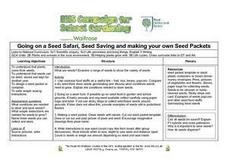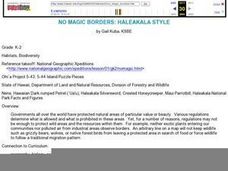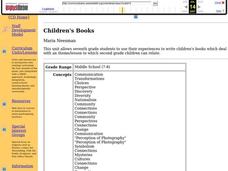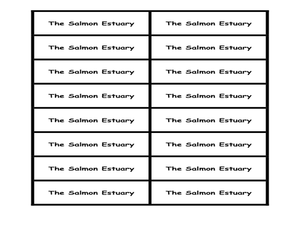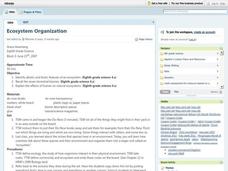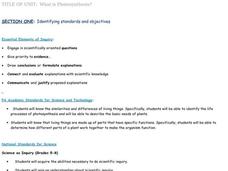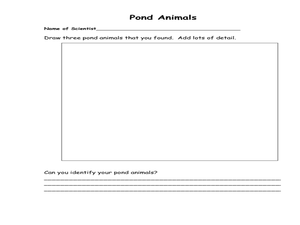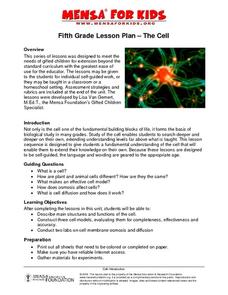Curated OER
Population Dynamics
High schoolers are divided into groups, each group goes to a randomly selected area of the field. They lay out a one square meter plot. Using string to mark the square. Students identify some sort of vegetation that is easy to count...
Curated OER
Why Is Climate Important to Growing Rice?
Third graders determine the location of major rice producing states in the United States. In this rice production lesson, 3rd graders locate the longitude and latitude of each rice producing state. They color the states and indicate...
Curated OER
Going on a Seed Safari
Students describe biology by identifying different plants in class. In this seed lesson, students discuss the process of how a plant grows from seed to leaves. Students attend a field trip to their garden or another park and collect a...
Teach Engineering
Complex Networks and Graphs
Show your class how engineers use graphs to understand large and complex systems. The resource provides the beginnings of graph theory by introducing the class to set theory, graphs, and degree distributions of a graph.
Curated OER
No Magic Borders: Haleakala Style
Students discuss borders and boundaries. They discuss pollution and the fact that boundaries cannot stop pollution and that pollution affects even protected wildlife and plants. They participate in an activity in which they must place...
Curated OER
Drosophila Melanogaster
Students cross wild type flies and mutants, both purchased from a biological supply house (Carolina Biological Supply or Wards, for example) in groups from lesson one.
Curated OER
This Stuff Makes Me Sick
Students participate in a lab showing the effects of pesticides on Lumbriculus variegatus. Several extensions and variations are also included in this lesson including one which relates the experiment to how pesticides enter our drinking...
Curated OER
Children's Books
Students explore daily dilemmas students face. They write and illustrate a story book dealing with one dilemma. Students write reviews of their books. They read their books to second grade students. Additional cross curriculum activities...
Curated OER
Is Cancer on the Rise or Decline in America Today?
Learners read an article about cancer in the United States. They research a cancer of their choice along with possible treatments. They identify types of cancer that are on the rise and decline for both men and women. They examine the...
Curated OER
Alzheimer's Disease
Investigate Alzheimer's disease. Conduct research using a variety of resources, obtain information, and input the data into a Microsoft Excel spreadsheet. Identify trends in the data and categorize them for an audience.
Curated OER
Transcription, Translation, and the Genetics of Microbes
Students construct various virus models using Fruit loops and Alphabits to represent nucleotides and molecules. They constructs capsomeres using shoes as the capsomeres and discuss various viruses.
Curated OER
Cool Corals
Students explore corals and polyps. In this coral reef lesson plan students divide into groups and prepare a written report.
Curated OER
Nature of Science and Ecology
Students identify the different biotic and abiotic components of an ecosystem. In this ecology instructional activity, students perform a case study on current environmental problems. They write a position statement about their chosen...
Curated OER
The Environment and Interactions of Living Organisms
Students study the environment and interactions of living organisms. They identify abiotic and biotic factors and create a foldable and vocabulary cards. They create a poster illustrating soil and watch a video to study symbiosis.
Curated OER
The Salmon Estuary And Human Impacts
Students have discussions and complete activities about the pacific salmon life cycle and marine parasites. In this salmon lesson plan, students complete activities such as observing sea lice, playing a tag game, and a board game.
Curated OER
REPRODUCTION
Students complete a variety of activities to study different concepts in Science. The activities are part of a layered curriculum. This is used to differentiate instruction and give a wide variety of assessment opportunities.
Curated OER
Ecosystem Organization
Eighth graders engage in a lesson about ecosystems with the intention of looking at how it is organized. They cover the biotic and abiotic factors of an ecosystem while looking at the seven types of terrestrial biomes. Students write...
Curated OER
Hypothermia on the High Seas
Students identify and present the effects on humans when the body temperature falls, demonstrate and explain how the body loses heat, and understand hypothermia and cold water survival techniques.
Curated OER
What is Photosynthesis?
Students investigate the similarities and differences of living things. Specifically, students will be able to identify the life processes of photosynthesis and describe the basic needs of plants.
Curated OER
Amphibians
Fourth graders Make flashcards for the following words, memorize them and get quizzed by the teacher: Amphibian, Lungs, complete metamorphosis, tadpoles, tail-less, tail, vertebrate, cold-blooded, gills, swamp, pond.
Curated OER
Pond and Pond Organisms
Students explore pond ecosystems. In this pond organism activity, students will use pond water and a plastic bad in order to locate and identify freshwater organisms. The activity is designed for younger grades, but includes an...
Curated OER
Rattle Your Bones and Flex Your Muscles
Third graders identify bones, muscles and joints. They explore and investigate the interaction between bones, muscles and joints, and movement of the hand or foot. To help the teacher provides a poster of the human skeleton.
Curated OER
The Cell
Tenth graders explore the parts of a cell. In pairs, classmates construct a model of a eukaryotic cell, detailing its morphology and function. With the use of computer technology, 10th graders create cell book for middle schoolers. ...
Curated OER
Cell-ebrations in Science
Students recognize that all living things are made up of cell and that they cannot easily be seen by the naked eye. Students become familiar with the use of microscopes as a tool for investigation.




